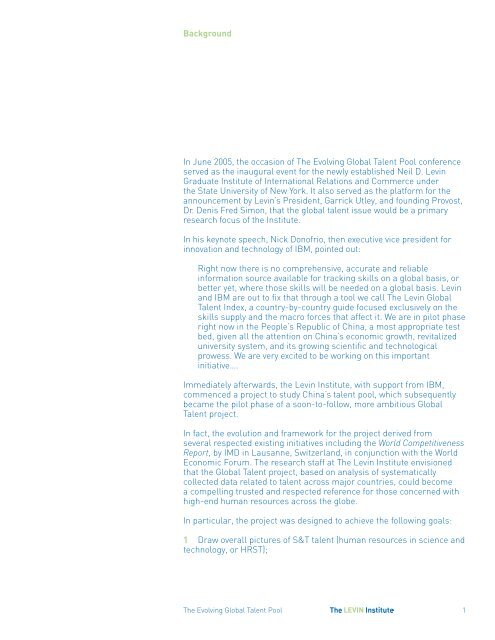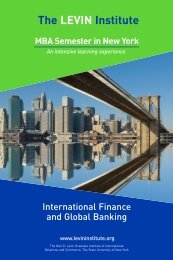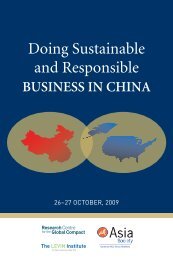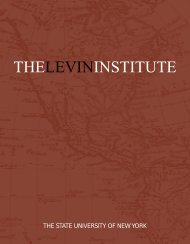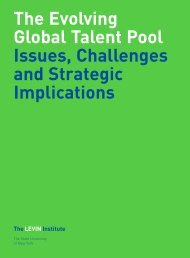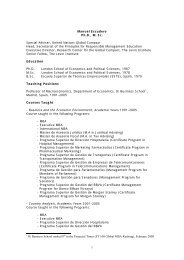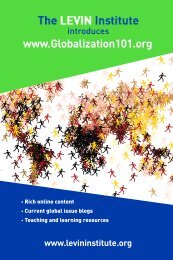The Evolving Global Talent Pool Lessons from the BRICS Countries
The Evolving Global Talent Pool Lessons from the BRICS Countries
The Evolving Global Talent Pool Lessons from the BRICS Countries
You also want an ePaper? Increase the reach of your titles
YUMPU automatically turns print PDFs into web optimized ePapers that Google loves.
Background<br />
In June 2005, <strong>the</strong> occasion of <strong>The</strong> <strong>Evolving</strong> <strong>Global</strong> <strong>Talent</strong> <strong>Pool</strong> conference<br />
served as <strong>the</strong> inaugural event for <strong>the</strong> newly established Neil D. Levin<br />
Graduate Institute of International Relations and Commerce under<br />
<strong>the</strong> State University of New York. It also served as <strong>the</strong> platform for <strong>the</strong><br />
announcement by Levin’s President, Garrick Utley, and founding Provost,<br />
Dr. Denis Fred Simon, that <strong>the</strong> global talent issue would be a primary<br />
research focus of <strong>the</strong> Institute.<br />
In his keynote speech, Nick Donofrio, <strong>the</strong>n executive vice president for<br />
innovation and technology of IBM, pointed out:<br />
Right now <strong>the</strong>re is no comprehensive, accurate and reliable<br />
information source available for tracking skills on a global basis, or<br />
better yet, where those skills will be needed on a global basis. Levin<br />
and IBM are out to fix that through a tool we call <strong>The</strong> Levin <strong>Global</strong><br />
<strong>Talent</strong> Index, a country-by-country guide focused exclusively on <strong>the</strong><br />
skills supply and <strong>the</strong> macro forces that affect it. We are in pilot phase<br />
right now in <strong>the</strong> People’s Republic of China, a most appropriate test<br />
bed, given all <strong>the</strong> attention on China’s economic growth, revitalized<br />
university system, and its growing scientific and technological<br />
prowess. We are very excited to be working on this important<br />
initiative….<br />
Immediately afterwards, <strong>the</strong> Levin Institute, with support <strong>from</strong> IBM,<br />
commenced a project to study China’s talent pool, which subsequently<br />
became <strong>the</strong> pilot phase of a soon-to-follow, more ambitious <strong>Global</strong><br />
<strong>Talent</strong> project.<br />
In fact, <strong>the</strong> evolution and framework for <strong>the</strong> project derived <strong>from</strong><br />
several respected existing initiatives including <strong>the</strong> World Competitiveness<br />
Report, by IMD in Lausanne, Switzerland, in conjunction with <strong>the</strong> World<br />
Economic Forum. <strong>The</strong> research staff at <strong>The</strong> Levin Institute envisioned<br />
that <strong>the</strong> <strong>Global</strong> <strong>Talent</strong> project, based on analysis of systematically<br />
collected data related to talent across major countries, could become<br />
a compelling trusted and respected reference for those concerned with<br />
high-end human resources across <strong>the</strong> globe.<br />
In particular, <strong>the</strong> project was designed to achieve <strong>the</strong> following goals:<br />
1 Draw overall pictures of S&T talent (human resources in science and<br />
technology, or HRST);<br />
<strong>The</strong> <strong>Evolving</strong> <strong>Global</strong> <strong>Talent</strong> <strong>Pool</strong><br />
1


